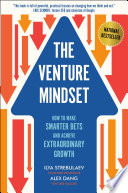

In 'The Venture Mindset', the author emphasizes that uncertainty is an inherent part of entrepreneurship and innovation. Rather than fearing the unknown, successful entrepreneurs learn to embrace it, viewing uncertainty as an opportunity for exploration and growth. By adopting a mindset that welcomes ambiguity, individuals can better navigate the challenges of launching and scaling ventures. This involves developing resilience, being open to adapting ideas based on feedback, and maintaining a curious attitude. The author illustrates this concept with real-world examples of entrepreneurs who thrived by taking calculated risks and pivoting when necessary, showcasing that a flexible approach can lead to unexpected successes.
Continue readingA core principle of the book is the importance of cultivating a growth mindset. This concept, originally popularized by psychologist Carol Dweck, posits that individuals who believe their abilities can be developed through dedication and hard work tend to achieve more than those who view their talents as fixed. In 'The Venture Mindset', the author discusses how entrepreneurs can harness a growth mindset to overcome failures and setbacks. By framing challenges as opportunities for learning, entrepreneurs can foster innovation and creativity. The book provides practical strategies for developing this mindset, such as seeking feedback, embracing challenges, and celebrating small wins, which can ultimately lead to greater success in their ventures.
Continue readingThe author highlights the significance of building a diverse network as a crucial element of the venture mindset. A diverse network not only provides access to varied perspectives and ideas but also opens doors to new opportunities. The book discusses how entrepreneurs can leverage their networks to gain insights, find collaborators, and secure resources. It emphasizes the importance of nurturing relationships across different industries, backgrounds, and experiences. The author shares stories of successful entrepreneurs who attributed their achievements to the diverse connections they cultivated, illustrating that collaboration and inclusivity can enhance innovation and problem-solving.
Continue readingAnother key idea presented in 'The Venture Mindset' is the value of iterative learning and experimentation. The author argues that successful entrepreneurs adopt a mindset of continuous improvement, where they test ideas, gather feedback, and refine their approaches based on real-world results. This iterative process allows entrepreneurs to pivot quickly and efficiently, minimizing the risks associated with launching new products or services. The book provides frameworks for implementing iterative learning, such as lean startup methodologies and design thinking, which encourage entrepreneurs to validate their assumptions and adapt their strategies based on user feedback. This approach not only fosters innovation but also builds a culture of agility within organizations.
Continue readingIn 'The Venture Mindset', the author discusses the concept of strategic risk-taking, which involves making calculated decisions that balance potential rewards with potential downsides. The book argues that successful entrepreneurs are not reckless; instead, they analyze risks carefully and make informed choices that align with their long-term goals. The author provides tools and frameworks for assessing risks, such as SWOT analysis and scenario planning, which help entrepreneurs evaluate the implications of their decisions. By understanding the difference between calculated risks and blind leaps of faith, entrepreneurs can position themselves for success while minimizing potential pitfalls.
Continue readingA significant theme in the book is the idea of purpose-driven entrepreneurship. The author posits that successful ventures are often built on a strong sense of purpose that goes beyond profit generation. Entrepreneurs who are motivated by a clear mission are more likely to inspire their teams, attract loyal customers, and navigate challenges with resilience. The book encourages readers to identify their core values and integrate them into their business models, fostering a culture that prioritizes social impact alongside financial success. Through case studies of purpose-driven companies, the author illustrates how aligning business practices with a greater mission can lead to sustainable growth and fulfillment.
Continue readingThe final key idea in 'The Venture Mindset' is the necessity of adaptability in an ever-evolving business landscape. The author emphasizes that the ability to pivot and adjust strategies in response to market changes, technological advancements, and consumer preferences is crucial for long-term success. The book discusses various strategies for fostering adaptability, such as embracing technological innovation, staying informed about industry trends, and encouraging a culture of experimentation within organizations. By cultivating an adaptable mindset, entrepreneurs can position themselves to seize new opportunities and navigate challenges effectively, ensuring their ventures remain relevant in a dynamic environment.
Continue readingThe reading time for The Venture Mindset depends on the reader's pace. However, this concise book summary covers the 7 key ideas from The Venture Mindset, allowing you to quickly understand the main concepts, insights, and practical applications in around 23 min.
The Venture Mindset is definitely worth reading. The book covers essential topics including Embracing Uncertainty, Cultivating a Growth Mindset, Building a Diverse Network, providing practical insights and actionable advice. Whether you read the full book or our concise summary, The Venture Mindset delivers valuable knowledge that can help you improve your understanding and apply these concepts in your personal or professional life.
The Venture Mindset was written by Alex Dang, Ilya Strebulaev.
If you enjoyed The Venture Mindset by Alex Dang, Ilya Strebulaev and want to explore similar topics or deepen your understanding, we highly recommend these related book summaries:
These books cover related themes, complementary concepts, and will help you build upon the knowledge gained from The Venture Mindset. Each of these summaries provides concise insights that can further enhance your understanding and practical application of the ideas presented in The Venture Mindset.